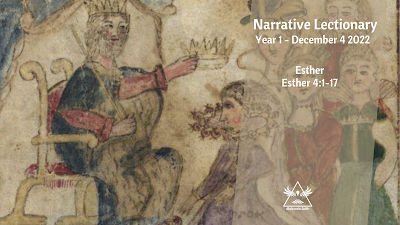Pace Warfield-May queeries the Narrative Lectionary reading.
Esther 4:1-17
1When Mordecai learned all that had been done--King Xerxes and the noble person Hamman had decided to kill the Jewish people because Mordecai, who was Jewish himself, was not paying appropriate tribute to Hamman--Mordecai tore his clothes and put on sackcloth and ashes, as you do, and went through the city, crying, wailing, and weeping bitterly. 2He went up to the entrance of the king’s gate, for no one might enter the king’s gate half naked like he was, donned only in his sackcloth 3In every province, wherever the king’s command and his decree about sending the Jewish people to death came, there was great mourning among the Jews, with fasting and weeping and lamenting, and most of them lay in sackcloth and ashes.
4Esther's handmaidens and castrated servants came and told her what was going on with Mordecai half naked outside the gate. The queen was deeply distressed; she sent garments to clothe Mordecai, so that he might take off his sackcloth and be able to enter the king's gate; but he would not accept them. 5Then Esther called for Hathach, one of the king’s castrated servants who had been appointed to serve her, and Esther ordered them to go to Mordecai to learn what was happening and why. 6Hathach went out to Mordecai in the open square of the city in front of the king’s gate, 7and Mordecai told them all that had happened to him, and the exact sum of money that Haman had promised to pay into the king’s treasuries for the destruction of the Jewish people. 8Mordecai also gave them a copy of the written decree issued in Susa for the destruction of the Jewish people so that Hathach might show it to Esther, explain it to her, and charge her to go to the king to make supplication to him and hopefully get him to change his mind on behalf of her people.
9Hathach went and told Esther what Mordecai had said. 10Then Esther spoke to Hathach and told them to reply to Mordecai with the following: 11"Everyone knows, from the king's slaves to the nobility, that if anyone goes to the king inside the inner court without being summoned by him, there is but one law—all are to be put to death. Only if the king holds out the golden scepter to someone, may that person live. I myself have not been called to come into the king's chamber for a month." 12When they told Mordecai what Esther had said, 13Mordecai told them to reply to Esther, "Even in the king's palace and as his wife, don't think you will have a better chance of escaping his genocide than the rest of the Jewish people. 14For if you keep silence at such a time as this, relief and deliverance will still rise up for the Jews from another path, but you and your extended family will still perish. Who knows? Perhaps you have come into your place as queen in the palace for just such a time as this." 15Then Esther replied to Mordecai, 16"Go, gather all the Jewish people to be found in Susa and hold a fast on my behalf. Do not eat nor drink for three days, night or day. I and my servants will also fast as you do. After those three days have passed, I will go to the king, even though it is against the law; and if I am murdered, I am murdered. So be it." 17Mordecai then went away and did everything as Esther had requested of him.
Queeries for the text:
What is this text building on?
What is the accompanying reading?
Where is this text headed?
Who was Esther?
What are different models of leadership? What makes a good leader?
How can you be an ally to a marginalized and/or oppressed group with your power?
What is genocide?
What can you do in such a time as this?
What are your queeries?

No comments:
Post a Comment